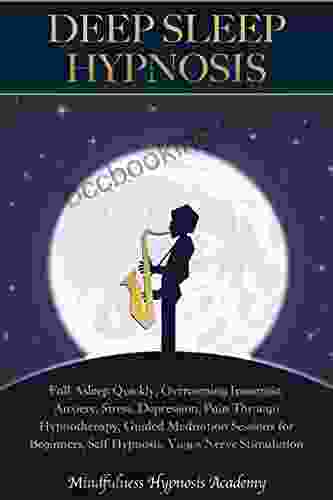Fall Asleep Quickly: Overcoming Insomnia, Anxiety, Stress, Depression, and Pain

Insomnia, anxiety, stress, depression, and pain are all common conditions that can make it difficult to fall asleep and stay asleep. When you're struggling with one or more of these conditions, it can feel like you're never going to get a good night's sleep again. But there is hope. There are a number of things you can do to improve your sleep quality and get the rest you need.
This comprehensive guide will provide you with everything you need to know about overcoming insomnia, anxiety, stress, depression, and pain. You'll learn about the causes of these conditions, the symptoms to look for, and the best treatment options available. You'll also find a number of practical tips and techniques that you can use to improve your sleep quality and get the rest you need.
Insomnia is a common sleep disFree Download that makes it difficult to fall asleep, stay asleep, or both. It can be caused by a variety of factors, including stress, anxiety, depression, and medical conditions. Insomnia can have a significant impact on your quality of life, leading to fatigue, irritability, difficulty concentrating, and impaired job performance.
4 out of 5
| Language | : | English |
| File size | : | 2200 KB |
| Text-to-Speech | : | Enabled |
| Screen Reader | : | Supported |
| Enhanced typesetting | : | Enabled |
| Print length | : | 37 pages |
| Lending | : | Enabled |
- Difficulty falling asleep
- Waking up frequently during the night
- Waking up too early in the morning and being unable to fall back asleep
- Feeling tired and unrested during the day
- Difficulty concentrating
- Irritability
- Impaired job performance
- Stress: Stress is a common cause of insomnia. When you're stressed, your body releases hormones like cortisol and adrenaline, which can make it difficult to fall asleep and stay asleep.
- Anxiety: Anxiety is another common cause of insomnia. When you're anxious, your mind is racing and you may find it difficult to relax and fall asleep.
- Depression: Depression can also lead to insomnia. When you're depressed, you may feel tired and unmotivated, but you may also have difficulty falling asleep and staying asleep.
- Medical conditions: Some medical conditions can also cause insomnia. These conditions include thyroid problems, diabetes, and heart disease.
- Medications: Some medications can also cause insomnia as a side effect. These medications include antidepressants, decongestants, and steroids.
There are a number of treatment options available for insomnia, including:
- Cognitive behavioral therapy (CBT): CBT is a type of talk therapy that can help you learn how to manage stress and anxiety, and improve your sleep habits.
- Medication: Medications can be helpful for treating insomnia, but they should only be used as a last resort.
- Lifestyle changes: There are a number of lifestyle changes you can make to improve your sleep quality, such as establishing a regular sleep schedule, creating a relaxing bedtime routine, and avoiding caffeine and alcohol before bed.
Anxiety is a normal reaction to stress. It can help us to stay safe and alert. However, when anxiety becomes excessive or persistent, it can interfere with our daily lives and make it difficult to sleep.
- Feeling restless or on edge
- Having a sense of impending doom
- Feeling like you can't control your thoughts
- Having difficulty concentrating
- Feeling irritable
- Having muscle tension
- Having difficulty sleeping
- Genetics: Anxiety can be inherited.
- Personality: People who are shy, inhibited, or perfectionistic are more likely to develop anxiety.
- Life events: Traumatic events, such as abuse, neglect, or accidents, can trigger anxiety.
- Medical conditions: Some medical conditions, such as thyroid problems, heart disease, and diabetes, can also cause anxiety.
- Medications: Some medications, such as stimulants and steroids, can also cause anxiety as a side effect.
There are a number of treatment options available for anxiety, including:
- Cognitive behavioral therapy (CBT): CBT is a type of talk therapy that can help you learn how to manage stress and anxiety, and improve your sleep habits.
- Medication: Medications can be helpful for treating anxiety, but they should only be used as a last resort.
- Lifestyle changes: There are a number of lifestyle changes you can make to reduce your anxiety, such as getting regular exercise, eating a healthy diet, and avoiding caffeine and alcohol.
Stress is a normal part of life. It can help us to stay motivated and productive. However, when stress becomes excessive or persistent, it can take a toll on our physical and mental health.
- Feeling overwhelmed or out of control
- Having difficulty concentrating
- Feeling irritable or angry
- Having difficulty sleeping
- Having muscle tension
- Having headaches or stomach problems
- Work: Work can be a major source of stress, especially if you have a demanding job or long hours.
- Money: Financial problems can also be a major source of stress.
- Relationships: Relationship problems can also be a major source of stress.
- Health problems: Health problems can also be a major source of stress, especially if you have a chronic illness.
- Life events: Major life events, such as moving, getting married, or having a baby, can also be a major source of stress.
There are a number of treatment options available for stress, including:
- Cognitive behavioral therapy (CBT): CBT is a type of talk therapy that can help you learn how to manage stress and anxiety, and improve your sleep habits.
- Relaxation techniques: Relaxation techniques, such as deep breathing, yoga, and meditation
4 out of 5
| Language | : | English |
| File size | : | 2200 KB |
| Text-to-Speech | : | Enabled |
| Screen Reader | : | Supported |
| Enhanced typesetting | : | Enabled |
| Print length | : | 37 pages |
| Lending | : | Enabled |
Do you want to contribute by writing guest posts on this blog?
Please contact us and send us a resume of previous articles that you have written.
 Book
Book Novel
Novel Page
Page Chapter
Chapter Text
Text Story
Story Genre
Genre Reader
Reader Library
Library Paperback
Paperback E-book
E-book Magazine
Magazine Newspaper
Newspaper Paragraph
Paragraph Sentence
Sentence Bookmark
Bookmark Shelf
Shelf Glossary
Glossary Bibliography
Bibliography Foreword
Foreword Preface
Preface Synopsis
Synopsis Annotation
Annotation Footnote
Footnote Manuscript
Manuscript Scroll
Scroll Codex
Codex Tome
Tome Bestseller
Bestseller Classics
Classics Library card
Library card Narrative
Narrative Biography
Biography Autobiography
Autobiography Memoir
Memoir Reference
Reference Encyclopedia
Encyclopedia Tim Burford
Tim Burford Sir John Whitmore
Sir John Whitmore Tim O Reilly
Tim O Reilly Scott Weems
Scott Weems Theo Hodges
Theo Hodges William Bryant Logan
William Bryant Logan Lucinda Fleeson
Lucinda Fleeson Natasha Ngan
Natasha Ngan Todd Siler
Todd Siler L X Beckett
L X Beckett The Editors Of Outside Magazine
The Editors Of Outside Magazine Lee Harrington
Lee Harrington Sean Cover
Sean Cover Kalynn Bayron
Kalynn Bayron Shane Shepherd
Shane Shepherd Worley Faver
Worley Faver Shaa Fazal
Shaa Fazal Kevina Hopkins
Kevina Hopkins Zita Grant
Zita Grant Wendy S Swore
Wendy S Swore
Light bulbAdvertise smarter! Our strategic ad space ensures maximum exposure. Reserve your spot today!

 Dylan MitchellWolf Message by Suzanne Giesemann: A Transformative Journey into the Heart of...
Dylan MitchellWolf Message by Suzanne Giesemann: A Transformative Journey into the Heart of...
 Curtis StewartProperty Casualty Sales Essentials: The Ultimate Guide to Succeeding in the...
Curtis StewartProperty Casualty Sales Essentials: The Ultimate Guide to Succeeding in the...
 Jacques BellDolls' Christmas: A Celebration of the Holiday Season in the World of Tasha...
Jacques BellDolls' Christmas: A Celebration of the Holiday Season in the World of Tasha...
 Samuel Taylor ColeridgeWe Still Don't Have a Miracle Baby: A Couple's Journey Through Infertility...
Samuel Taylor ColeridgeWe Still Don't Have a Miracle Baby: A Couple's Journey Through Infertility... John Dos PassosFollow ·10.5k
John Dos PassosFollow ·10.5k Jeff FosterFollow ·19.8k
Jeff FosterFollow ·19.8k Dakota PowellFollow ·10.5k
Dakota PowellFollow ·10.5k Kirk HayesFollow ·11k
Kirk HayesFollow ·11k Dan BrownFollow ·10.9k
Dan BrownFollow ·10.9k Israel BellFollow ·16.9k
Israel BellFollow ·16.9k Jeffrey CoxFollow ·16.2k
Jeffrey CoxFollow ·16.2k George MartinFollow ·10.6k
George MartinFollow ·10.6k

 Amir Simmons
Amir SimmonsImmerse Yourself in the Enchanting Realm of Nora Roberts'...
Prepare to be captivated by...

 Dan Henderson
Dan HendersonUnleash the Explosive Action of Going Ballistic Combined...
Prepare for an...

 Jeffery Bell
Jeffery BellDiscover the Controversial and Captivating "The Anarchist...
In the realm of literature, there are...

 Ryan Foster
Ryan FosterUnveiling Lincoln's Eloquence: How His Greatest Speeches...
In the annals of American...

 Jaime Mitchell
Jaime MitchellLove Radio Vinny Berry: A Journey of Heartbreak, Healing,...
Vinny Berry's...
4 out of 5
| Language | : | English |
| File size | : | 2200 KB |
| Text-to-Speech | : | Enabled |
| Screen Reader | : | Supported |
| Enhanced typesetting | : | Enabled |
| Print length | : | 37 pages |
| Lending | : | Enabled |






